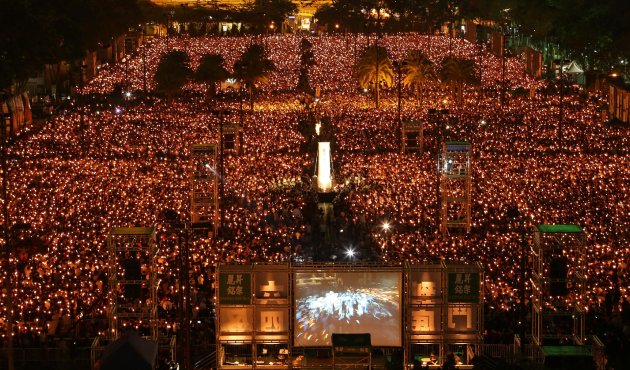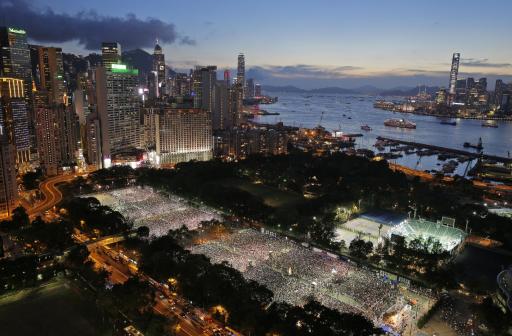Mao and Forever
Xi Jinping’s Authoritarian Reforms
By Peter Martin and David Cohen
June 3, 2014
A year and a half into Chinese President Xi Jinping’s rule, who he is and what he wants remains something of a mystery. At times, he has appeared to be a reformer in the mold of Deng Xiaoping; one of Xi’s first acts in office was to reenact the great reformer’s “Southern Tour,” which kicked off market reforms after the 1989 massacre at Tiananmen Square. At other times, he has appeared nostalgic for the revolutionary socialism of Mao Zedong. A few months after his trip to the south, Xi made a high-profile visit to Xibaibo, the last headquarters of the People’s Liberation Army during the Chinese Civil War and a sacred site for left-wing devotees of Mao.
Xi’s policies have been as contradictory as his image. He has launched high-profile drives to encourage private enterprise and stem corruption. But he has coupled them with a pledge to maintain the state as the “core” of the economy and a broad crackdown on political dissent. So does Xi intend to inaugurate a new era of reform that will bring China fully into the modern world, or does he intend to double down on statist authoritarian rule and revive Mao’s populist Marxism?
In short, all of the above. Xi’s economic reforms and his Maoist political tendencies are both tactics in a strategy meant to preserve the one-party system by reforming it. His methods attest to his recognition of contemporary China’s biggest problems: rampant corruption, a sclerotic political system, and an economic model that is rapidly running out of steam. To address those without dismantling the system that brought him to power, Xi promises to reconcile Mao, state-owned companies, and Chinese Communist Party dominance with a dynamic and open economy. He will do so by making what he calls the “two hands,” the state and the market, work together and inspiring the party to believe in itself and in its mission to serve the Chinese people.
THE HAND OF XI
Over the last decade, Xi has participated in an intense debate over the role of the state and the market at the very top of the party. On one side are those who argue that the reformist spirit established under Deng and Jiang Zemin, the party’s general secretary between 1989 and 2002, had been lost to political gridlock and powerful vested interests opposed to further reform. On the other side are those who argue that the headlong pursuit of marketization has seen the party lose its sense of purpose and created unsustainable levels of inequality and corruption.
Xi found a way to split the difference. He argued that the state and the market do not have to compete. The “invisible hand” of the market and the “visible hand” of the state, he said, can reinforce each other. As he explained in his regular column in the Zhejiang Daily, the hand of the market should “adjust” the economy, promote efficiency, and lead urban development, whereas the state should focus on social management, public services, fairness, and rural development. This theory allowed him to position himself as both a champion of the state sector and a student of Adam Smith: “This concept of marketization is very clearly explained in Adam Smith’s Wealth of Nations, where he introduces the theory of two hands,” Xi told CCTV, China’s main television station, in 2006.
Xi put his model to work in Zhejiang, where he was party secretary between 2002 and 2007. In that province, he aimed to support private enterprise, including through a massive reduction in bureaucratic red tape (the list of items requiring government approval fell from a total of 3,000 to just 800). At the same time, he worked hard to reassure the public and officials that the state would still be important. He defended state-owned enterprises (SOEs), which are seen by economic liberals as the worst offenders in China’s unsustainable model of state-led overinvestment. He explained that greater government support for private companies could improve the state sector by making it compete. SOEs could also then benefit from more private investment, and the government would get more tax revenue.
Xi’s experience in Zhejiang seemed to vindicate his model. Xi boasted that, from 1978 to 2004, 71.4 percent of Zhejiang's GDP growth had come from private enterprises, even as the total size of its state-owned assets had increased 42 times over.
Xi’s model also worked for Xi. During his stint as party secretary in Zhejiang, Xi distilled his work on economics into two books, published in December 2006 and August 2007: Work on Real Things, Walk at the Forefront and New Thoughts from the Yangtze. Both were crafted to help him win one of the world’s most mysterious elections -- the first-ever selection of a head of government by China’s “collective leadership” in the years leading up to the 2012 handover. His predecessors, Hu Jintao and Jiang, had been hand-picked by Deng. Before his gradual retirement and eventual death in 1997, Deng set up a system -- opaque and little-understood outside of the party -- for party elites to agree on a top leader without the guidance of the original revolutionary generation. That system meant that Xi had to win over a broad constituency of party elites to be selected. To some extent, his family ties, political patrons, deals, alliances, and favors helped do that job. But Xi also had to prove that he could be trusted with the one goal that everyone agreed on: keeping the party in power. And there, his theories proved persuasive.
Having won national power, Xi was given a mandate to implement the “two hands” strategy on a larger scale. As president of China, he has tried to support the market by abolishing government approvals for many kinds of economic and business activity; reforming the financial sector, including by allowing private banking; making it easier to set up new companies; and opening up more economic sectors to competition. He has also attempted to impose financial discipline on SOEs by exposing them to greater competition and encouraging private investment in the state sector. As Xi said at the National People’s Congress in March, he expects these reforms to “not only not weaken, but to strengthen” SOEs. Two hands has thus become a central way that the Xi administration summarizes its approach to the economy. On May 27, Xi presided over a “collective study session” of the Politburo, which specified that the “two hands” should work together in a “unified, mutually complementary and coordinated” manner. The party mouthpiece, The People’s Daily, has event referred to two hands as “the core proposition of the reform process.”
Xi has also taken his economic theories to the social sphere; just as markets can support a statist economy, he has argued, civil society can work with a repressive state to support social order. In Xi’s China, citizens can contribute as “positive social forces.” Xi has pushed for new rules that make it easier to register NGOs and for NGOs to work with local governments to provide social services. He has also curbed or abolished overtly abusive practices, such as re-education through labor. But, at the same time, his government has strengthened repression. He has given no ground on freedom of expression or assembly, and he has introduced new laws against such vague crimes as “spreading rumors.”
BACK TO MAO’S FUTURE
In the years ahead, Xi will have to face what he and his predecessors have described as a potentially fatal threat to party legitimacy: corruption. He will have to find a way to control the everyday abuses of power that fuel popular outrage and protest -- bribery, forced demolitions, and wanton indifference to public health and safety. Campaigns launched by Xi’s predecessors tried and failed to solve these problems, as local officials simply refused to change their practices, trusting that “the mountains are high and the emperor is far away.” This time, though, Xi has looked to Mao for an answer.
Mao knew how to get people’s attention: ideological mobilization and terror. He was able to inspire millions of Chinese to fight for change, even when change meant schemes that made sense only to him and resulted in mass death and suffering. Now, faced with millions of officials reluctant to accept reform, Xi hopes to harness this kind of power to clean up the party.
Since becoming president, Xi has required officials to study Maoist theory, particularly Mao’s “mass line,” which says that the party should be both a part of the people and capable of leading them. In turn, Xi has put limits on official banquets, gift giving, and the use of official cars, and has encouraged officials to interact with the public. He has put in appearances at Beijing restaurants and on busy shopping streets and has also mandated -- and, along with his colleagues in the leadership, led -- numerous “self-criticism” sessions, in which party cadres publicly evaluate their own success in connecting with the people.
Xi has effectively asked officials under him to give up many of the perks of office. The stakes, he says, are the very survival of the party. An educational campaign based on the famous “Document Number Nine” has promoted what party theory calls a “sense of danger” about the threat of the party’s collapse due to internal subversion and foreign attempts to undermine it. For many officials, that has been enough: Local officials complain about the drastic drop off in official gift-giving across the country, and the luxury sector has taken a big hit as a result.
For those who refuse to buy into Xi’s project, though, he has launched the biggest purge in decades. His weapon of choice is the Central Discipline Inspection Commission, the party’s anti-graft organization, which Xi has greatly strengthened under the leadership of long-term friend and ally Wang Qishan. Wang has presided over the detention of hundreds of officials across the party, government, industry, and academia. Those investigated effectively disappear from the face of the earth and are subjected to horrors one survivor recently described to the Associated Press as “a living hell.”
Xi’s use of Maoist politics has limits, though. Unlike Mao, Xi has made efforts to keep political campaigns and crackdowns under control. Mao asked the public to participate in purges, setting off the chaos of the Cultural Revolution. By contrast, Xi’s political campaigns and purges have been organized by central party bodies and led by him and his Politburo colleagues. They are intended to strengthen party institutions rather than to dismantle them -- both to make the “visible hand’s” power honest enough to be accepted, and to enlist lower-level officials in implementing the economic changes Xi has called for.








